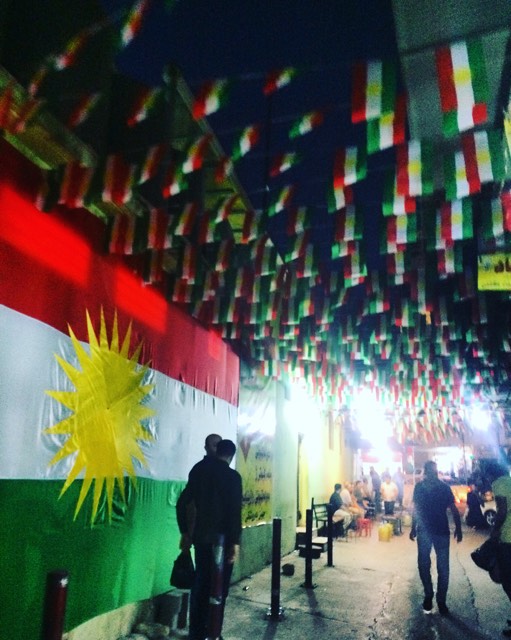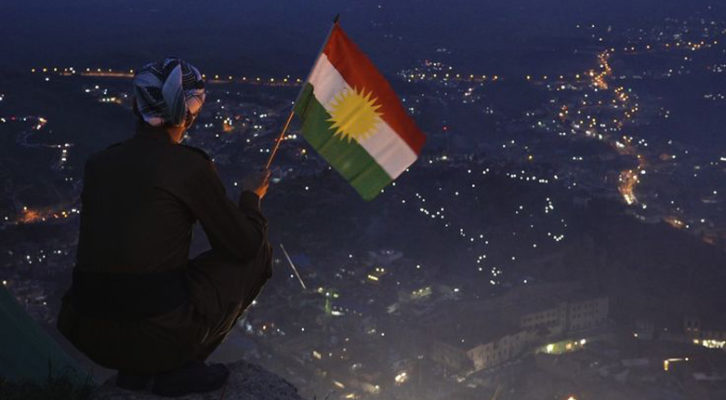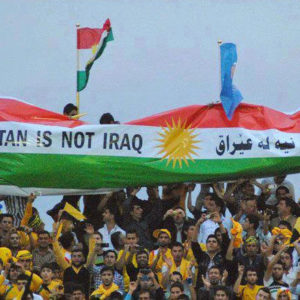I first came to Kurdistan in late July of 2014. My first month was colored with constant conversations and anxiety surrounding ISIS and it’s seizure of Kurdish land. My television was fixed on news stations as my colleagues and I watched more and more of this region succumb to the brutal takeover of ISIS. I watched the images of Mosul, Sinjar and countless other villages falling to ISIS control with horror. I read the stories of the barbaric murder, rape, and torture of civilians and watched as the IDP (Internally displaced people) population in Erbil grew exponentially. I knew I was bearing witness to a dangerous darkness – one that lead me to question the resiliency of our collective humanity.
Back home, the media and politicians exploited the terrible images coming out of this region to fuel their Islamophobic rhetoric and policies. The saturation of these images in the media at that time made the general public easy prey for fear based politics, its effect felt most seriously on immigration and refugee policies. I watched as my peers posted and shared dangerous opinions about Muslims and this region as a whole. Social media became a battle ground between those insisting their way of life was threatened by the group terrorizing this corner of the world and those arguing for the protection of the rights and freedoms of refugees, immigrants and Muslims as whole.
Meanwhile in Kurdistan, despite ISIS’s quick advancement towards Erbil, Kurdistan’s capital city, life continued. Schools remained open, essential services were provided and people continued to socialize in malls and restaurants. The Kurdish military forces, the Peshmerga – meaning, ‘those who face death’ – waged a brutal war against ISIS fighters. Slowly winning back territory, the Peshmerga began to gain international recognition as the force most capable of stopping the horrifying expansion of ISIS across Kurdistan, Iraq and Syria.
As I left Kurdistan in April of 2015, the Peshmerga were continuing their fight against ISIS, sacrificing their lives for the safety and security of the people living in this region. To date, Peshmerga officials estimate about 1,500 Peshmerga have been killed and 9,000 wounded in the war against ISIS. While these numbers show the devastating loss of life of military members, they do not paint a complete picture of the acute effects on families Kurdistan’s role against ISIS had. They do not describe the plight of families that were fractured by military service, the children traumatized by the absence of parents or the economic impacts on those who were unpaid for their services. Perhaps most significantly, the numbers of Kurdish lives lost in the fight against ISIS do not depict the collective trauma thrust upon the region.
Today, I find myself back in Kurdistan, having returned in July of this year. This time to Duhok, a city in the North West of Kurdistan with a population of 250,000. Since President Barzani’s announcement of a referendum for independence from Iraq on June 7, 2017, Duhok has been alight with buzzing energy shown in daily demonstrations in support of the referendum. From my apartment window at night, I watch hopeful fires spread across the mountains in the distance and hear the optimistic cheers of a free and independent Kurdistan from people on the street below. Large neon lights have been used to create a massive check mark on the side of one of the mountains surrounding Duhok, representing a definitive ‘Yes’ vote.
This city has remained unshaken by disapproval of the referendum by it’s neighbors Turkey and Iran and of course, Iraq and the United States. Children wave flags excitedly from the windows of their parents’ cars, the bazaar is covered in posters, lights and flags depicting support for an independent Kurdistan. My classes are punctuated with vibrant discussions surrounding the support of President Barzani’s referendum. Here in Duhok, despite all criticisms and arguments against the referendum, hope wins.

Bazaar, Duhok (September, 2017)
Sitting at my desk now, reflecting on the eve of the referendum, my mind runs through memories of the faith the international community placed – and continues to place – on the Peshmerga in the fight against ISIS and the suffering of the Kurds under the hands of Saddam Hussein. My mind remembers crossing the Ibrahim Khalil/Habur Border between South-East Turkey and Iraq three weeks ago, where those wanting to cross – largely, Kurds – waited over 12 hours outside their cars in the summer heat for the border to reopen. My mind recalls the conversation with a twenty-four year old student from Zahko who described the numbness he feels in relation to the sounds of bombs and death counts and the supreme hope he and his family have for independence, for an identity he feels they have earned with blood.
Is now the right time to hold a referendum? The world is convinced it is not. Super-powers are urging Barzani to postpone and find an alternative to his referendum, but, he refuses. The international community argues that the vote could spark further violence in the region – a speculation certainly substantiated by the recent closure of Iranian airspace. Still, Barzani refuses to budge. On the day before the referendum, it certainly seems that despite all condemnations, the Kurdish people will in fact have the opportunity to bring their hope to tangibility and vote for an independent Kurdistan. Like it or not, the world will bear witness.







